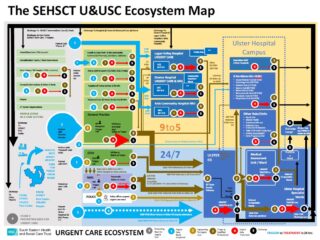Q Exchange
Designing Unscheduled Care
- Idea
- 2024

What is the challenge your project is going to address and how does it connect to the theme of 'How can we improve across system boundaries?
The increased demand on services and complexity and acuity of patients is well documented across the NHS.
Urgent & Unscheduled (U&USC) care services in the geographical area of Northern Ireland’s South-East Health & Social Care Trust (SEHSCT) play a key role in supporting the health and care of people with a wide range of increasingly complex health and care needs. These services involve interactions between primary and secondary care and a range of other services including the Police and Northern Ireland Ambulance Services, GP Out of Hours services, Nursing & Residential Homes, Community Pharmacies and 3rd sector organisations.
An Eco System Map across services and organisations has enabled a foundation of understanding this complex system and help focus the initial collaboration to support improvement and partnership.
What does your project aim to achieve?
The primary aim of SEHSCT’s Ecosystem of U&USC is to deliver maximum value from available resources to ensure the right, high quality care is provided to those with urgent care needs at the right time in the right place.
Secondary aims are:
• Taking a shared responsibility across all services for providing urgent care to the patient within 24 hours of referral seven days per week, delivering: Right Patient, Right Place, Right Care, Right Time – Right Everything.
• Bringing everybody on board with the need to continuously improve the whole system by clearly communicating shared aims.
• Develop a culture of shared accountability across the whole system, by highlighting the key contribution played by all services in delivering U&USC.
• Reducing the number of steps experienced by patients in accessing U&USC Care.
• Ensuring U&USC improvements are informed by the patient voice.
• Making U&USC care accessible accessible closer to home (where appropriate).
How will the project be delivered?
We are keen to build in our quality team’s skills and capacity by partnering with a system designer to support service and innovation interaction.
By working with a system designer for a year using the original eco system map learning we hope to take a new approach to radical system design to support potential solutions to the complex nature of USC. This will involve quality planning to project population health needs and design unscheduled care partnerships with service providers and communities for the future.
This is a new approach for SEHSCT which is committed to a quality management system in delivering care, we are keen to pilot system design in how we become a Trust for the future.
How is your project going to share learning?
As this is the use of a new approach we plan to evidence the process, methodology and outcome of using service design and partnering with a designer to make changes.
As a quality team we will include robust evaluation of the approach and plan to share the learning to our Senior Managers, Trust Board and staff. Also as this will be collaborative work to share and evaluate learning across the community and voluntary organisations and service users. We hope to share across organisations through presentations at conferences and peer review journals.
How you can contribute
- We would love to hear from teams that have worked with service designers to take a systems approach to redesign of unscheduled care.
Plan timeline
| 27 Mar 2024 | Building partnerships across the system |
|---|---|
| 29 Mar 2024 | Workshops planned with NIAS and C&V |
Comments
Jacqueline Morton 15 Mar 2024
Ruth, Jocelyn and Claire what a very timely QI project based on a need for understanding across our NI Health Network. I was wondering how you plan to engage local communities in your work?
Comments are now closed for this post.